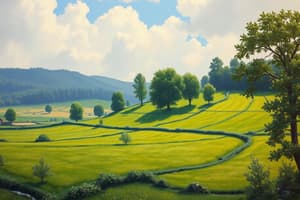Podcast
Questions and Answers
What negative impacts can deforestation, desertification, and urbanization have on ecosystem services?
What negative impacts can deforestation, desertification, and urbanization have on ecosystem services?
- Leading to the loss of vegetation cover (correct)
- Decreasing pollution levels
- Promoting habitat preservation
- Enhancing pollination and nutrient cycling
How do human activities like habitat destruction affect wildlife habitats?
How do human activities like habitat destruction affect wildlife habitats?
- Improving ecological functions
- Enhancing pollination
- Supporting ecosystem balance
- Threatening the survival of many species (correct)
What environmental issues can mining operations lead to when extracting mineral resources from land?
What environmental issues can mining operations lead to when extracting mineral resources from land?
- Enhancing ecosystem balance
- Causing soil erosion and water pollution (correct)
- Increasing biodiversity
- Reducing habitat destruction
Why are sustainable extraction practices and resource conservation crucial in mining operations?
Why are sustainable extraction practices and resource conservation crucial in mining operations?
Why is managing and conserving land resources vital for promoting sustainable development?
Why is managing and conserving land resources vital for promoting sustainable development?
Human beings interact with nature through ______ and create institutions to accelerate their economic development.
Human beings interact with nature through ______ and create institutions to accelerate their economic development.
Resources are a function of ______ activities.
Resources are a function of ______ activities.
Human beings themselves are essential components of ______.
Human beings themselves are essential components of ______.
These resources can be classified on the basis of ______ - biotic and abiotic.
These resources can be classified on the basis of ______ - biotic and abiotic.
On the basis of ______ – renewable and non-renewable.
On the basis of ______ – renewable and non-renewable.
Flashcards are hidden until you start studying
Study Notes
Land resources refer to various types of natural environments and ecosystems found on Earth's surface. These resources include soil, water, vegetation, wildlife habitats, and minerals, among others. The management of these resources is crucial to maintaining ecological balance, supporting human needs, and promoting sustainable development.
Soil Resources
Soil is one of the most essential land resources. It provides nutrients for plants, supports plant roots, and helps regulate Earth's climate by storing carbon dioxide and releasing oxygen through photosynthesis. Soil degradation due to deforestation, unsustainable farming practices, and pollution can lead to negative impacts on ecosystem services and agricultural productivity.
Water Resources
Water is another vital land resource, both above ground (rivers, lakes) and below ground (groundwater). Clean water supplies are essential for human health, agriculture, industry, and recreation. However, water pollution from industrial activities, household waste disposal, and other sources can lead to negative impacts on ecosystems and human health.
Vegetation Resources
Vegetation covers approximately half of the Earth's land surface and plays a crucial role in maintaining ecological balance. Trees, grasses, and other plants absorb carbon dioxide, produce oxygen through photosynthesis, prevent soil erosion, and support wildlife habitats. Deforestation, desertification, and urbanization can lead to the loss of vegetation cover and negative impacts on ecosystem services.
Wildlife Habitats
Land resources provide habitats for diverse wildlife species, including mammals, birds, insects, and plants. These habitats support essential ecological functions such as pollination, nutrient cycling, and pest control. Human activities such as habitat destruction, fragmentation, and pollution can threaten the survival of many species and disrupt ecosystem balance.
Mineral Resources
Mineral resources, such as oil, natural gas, coal, and minerals like iron, copper, and gold, are extracted from land resources for various industrial and energy purposes. However, mining operations can lead to soil erosion, water pollution, and habitat destruction. Sustainable extraction practices and resource conservation efforts are crucial to minimize these impacts.
In conclusion, managing and conserving land resources effectively is vital for maintaining ecological balance and promoting sustainable development. Efforts to protect and restore degraded land and manage resources sustainably are essential for ensuring a healthy planet and supporting human needs.
Studying That Suits You
Use AI to generate personalized quizzes and flashcards to suit your learning preferences.




